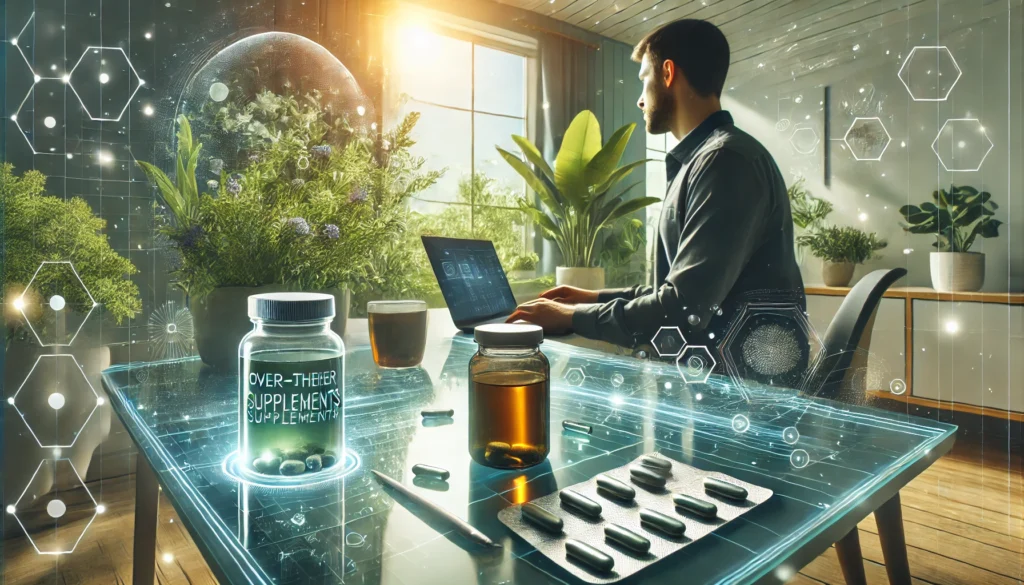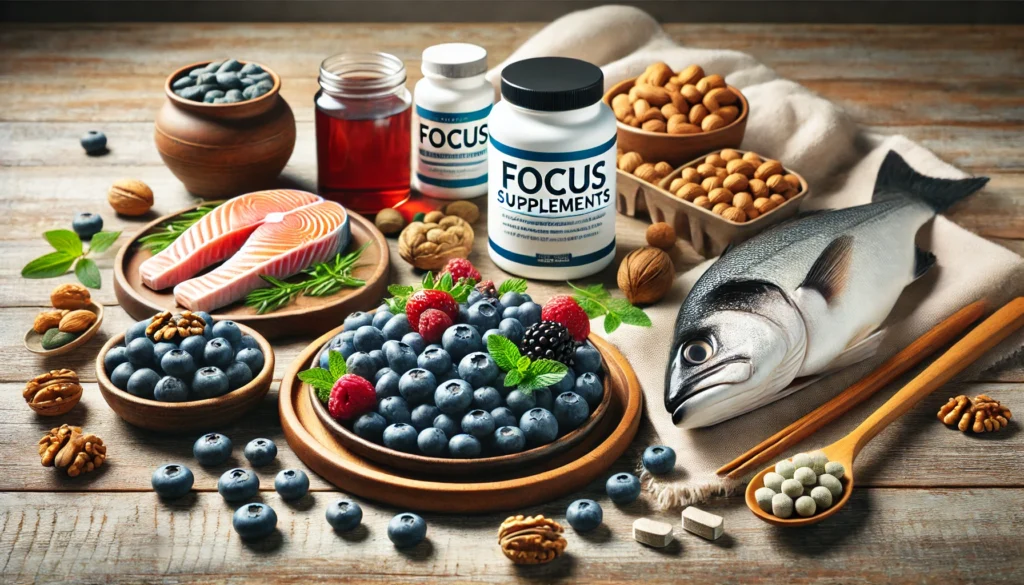Understanding the Need for Focus and Concentration Enhancers
In today’s fast-paced world, the ability to concentrate is more crucial than ever. With distractions at every turn and increasing cognitive demands from work, school, and daily responsibilities, many individuals are seeking effective solutions to enhance their focus and mental clarity. While prescription medications for conditions like ADHD have long been the go-to solution, there is a growing interest in over-the-counter (OTC) alternatives that can provide similar benefits without requiring a doctor’s prescription. This shift in consumer behavior has led to an increasing demand for focus medication that is accessible, effective, and safe for long-term use.
You may also like: Best Over the Counter Nootropics for Energy & Focus: Top Picks for Peak Performance
Understanding the role of OTC stimulants for ADHD, cognitive enhancers, and other natural and synthetic supplements is key to making an informed decision. Not all medications that help you concentrate are created equal. Some are designed to target energy levels, others work by increasing neurotransmitter activity, and some focus on improving blood flow to the brain. This article explores the best OTC meds for focus and concentration, how they work, and what factors should be considered when choosing the right one for individual needs.

How Do Focus Medications Work?
Before selecting a medication that helps you focus, it’s important to understand how these substances interact with the brain. The human brain relies on a complex network of neurotransmitters, including dopamine, norepinephrine, and acetylcholine, to regulate attention, memory, and cognitive function. Many drugs that help you concentrate work by modulating these neurotransmitters to enhance mental performance.
Stimulants are among the most common types of focus-enhancing drugs. These substances, including both prescription amphetamine ADHD drugs and OTC alternatives, stimulate the central nervous system to improve wakefulness and attention. Another category of concentration drugs includes nootropics, which work by supporting brain function through neuroprotection, enhanced circulation, and improved neuroplasticity. While prescription psychostimulant medications are highly effective, OTC options can also provide significant cognitive benefits with fewer side effects.
Common Over-the-Counter Medications for Focus and Concentration
For individuals looking for non-prescription alternatives, there are several categories of OTC meds for focus and concentration. These include natural nootropics, synthetic cognitive enhancers, and herbal supplements known for their brain-boosting properties. Some of the most popular options include:
1. Caffeine and L-Theanine
Caffeine is one of the most widely used stimulants in the world and is known for its ability to increase alertness and reduce fatigue. When combined with L-theanine, an amino acid found in tea, the effects of caffeine become more balanced, leading to sustained focus without the jitteriness commonly associated with stimulant use. Many over-the-counter ADHD medications for children and adults alike include this combination due to its effectiveness in promoting concentration and mental clarity.
2. Racetams (Piracetam and Aniracetam)
Racetams are a class of nootropics that work by modulating neurotransmitters involved in memory and learning. Piracetam, one of the most well-known racetams, has been shown to enhance cognitive function by increasing blood flow to the brain. Aniracetam, a more potent alternative, is often used for its mood-boosting and anxiolytic effects, making it a popular choice for individuals experiencing cognitive decline or attention difficulties.
3. Adaptogens and Herbal Supplements
Adaptogenic herbs like Rhodiola Rosea, Bacopa Monnieri, and Ginseng have long been used for their cognitive-enhancing properties. These herbs help regulate stress hormones, reduce mental fatigue, and improve cognitive resilience. Bacopa Monnieri, in particular, has been studied for its ability to enhance memory retention and learning capacity, making it a valuable addition to any regimen aimed at improving focus.
4. Acetylcholine Boosters
Choline-based supplements, such as Alpha-GPC and Citicoline, are essential for acetylcholine production, a neurotransmitter associated with learning and memory. These compounds have been extensively researched for their neuroprotective effects and their ability to enhance synaptic plasticity, making them ideal for individuals looking to improve cognitive performance naturally.
Comparing OTC Medications to Prescription Stimulants
While many OTC stimulants for ADHD offer cognitive benefits, it’s important to compare their effectiveness to prescription medications like Adderall-type medications. Prescription psychostimulant medications work by directly increasing dopamine and norepinephrine levels in the brain, providing rapid and potent effects. However, they come with a range of potential side effects, including dependence, cardiovascular risks, and insomnia.
In contrast, OTC focus pills tend to have a more gradual effect and pose fewer health risks. While they may not be as powerful as amphetamine ADHD drugs, they provide a safer and more sustainable approach to cognitive enhancement. Individuals who experience mild to moderate focus issues may find that OTC options are sufficient, while those with more severe attention deficits might require medical intervention.
Choosing the Right Medication for Your Needs
When selecting a medication for focus and concentration, it’s crucial to consider several factors, including individual cognitive needs, tolerance levels, and potential side effects. The best drugs for focus and concentration should align with personal goals, whether that be increased energy, enhanced memory retention, or improved executive function.
For students and professionals looking for short-term cognitive boosts, caffeine and L-theanine may be the best choice. For individuals with persistent attention difficulties, nootropic compounds like racetams and choline supplements may offer longer-lasting benefits. Those who struggle with stress-induced cognitive impairment might benefit more from adaptogens that help regulate cortisol levels.
Safety Considerations and Potential Side Effects
Despite the benefits of OTC focus pills, it’s important to use them responsibly. Some over-the-counter medications can interact with other drugs, leading to unintended side effects. Common issues associated with cognitive enhancers include headaches, digestive discomfort, and overstimulation. Additionally, individuals with underlying health conditions should consult with a healthcare professional before using any new supplement or medication.
To ensure safety and effectiveness, it’s advisable to start with lower doses and monitor how the body responds before increasing intake. Understanding individual tolerance levels and adjusting usage accordingly can help prevent adverse effects while maximizing cognitive benefits.

Frequently Asked Questions (FAQ) on Focus Medications and Cognitive Enhancers
1. What are the most effective focus drugs for ADHD?
There are several highly effective focus drugs for ADHD, each working differently to enhance attention and cognitive performance. Amphetamine-based medications, such as Adderall and Vyvanse, are among the most commonly prescribed due to their ability to increase dopamine and norepinephrine levels in the brain. Methylphenidate-based drugs, like Ritalin and Concerta, work similarly but have a shorter duration in some cases. Additionally, non-stimulant medications such as Atomoxetine offer an alternative for those who experience adverse effects from traditional stimulants. Understanding the differences between these drugs that help you focus can help patients and doctors make informed decisions about the best treatment options.
2. Are there over-the-counter (OTC) stimulants for ADHD that actually work?
Yes, there are a few OTC stimulants for ADHD that can enhance concentration, but their effectiveness is generally lower than prescription medications. Some of the most popular options include caffeine-based supplements, L-theanine (often combined with caffeine for a balanced effect), and nootropic compounds like Rhodiola Rosea and Bacopa Monnieri. While these focus pills for ADHD can improve alertness and energy levels, they do not typically provide the same level of cognitive enhancement as prescription stimulants. People considering OTC options should consult a healthcare provider to ensure they are safe and appropriate for their needs. Additionally, lifestyle factors such as diet, exercise, and proper sleep play a critical role in maximizing focus.
3. How do focus medications impact long-term cognitive health?
Long-term use of focus medications, particularly stimulant-based ones, has been extensively studied. Research suggests that when used as prescribed, these drugs for focus and concentration do not cause significant cognitive decline. However, dependency and tolerance can develop, leading to the need for periodic medication adjustments. Some studies indicate potential long-term neuroprotective effects, as maintaining cognitive function in ADHD patients can prevent academic and professional setbacks. It is crucial to have regular medical checkups to assess the ongoing need for medication and explore alternative strategies, such as behavioral therapy, to enhance focus naturally.
4. What are the best non-stimulant alternatives to Adderall-type medications?
For individuals who cannot tolerate stimulant-based medications, several non-stimulant alternatives exist. Atomoxetine (Strattera) is a common choice, working by increasing norepinephrine levels without the stimulant effects. Guanfacine and Clonidine, originally developed for blood pressure regulation, have also shown effectiveness in improving focus and impulse control in ADHD patients. Certain nootropic supplements, such as Omega-3 fatty acids and Ginkgo Biloba, have demonstrated cognitive benefits. While these alternatives may not work as quickly as stimulant-based drugs that make you focus, they often provide a steadier effect without the risk of dependency or abuse.
5. Can generic ADHD and chronic fatigue drugs be as effective as brand-name versions?
Yes, generic ADHD and chronic fatigue drugs are often just as effective as their brand-name counterparts, as they contain the same active ingredients. However, some people report differences in effectiveness due to variations in the formulation, such as binders and fillers. Additionally, the release mechanisms of extended-release versions may not be identical. If a patient notices a difference in effectiveness after switching to a generic version, consulting a healthcare provider can help determine whether an adjustment is needed. In many cases, trying a different generic manufacturer may resolve any discrepancies in performance.
6. What are the risks of using medication that helps you focus for non-medical purposes?
Using medication to help you concentrate without a medical prescription can lead to significant risks, including dependency, cardiovascular issues, and psychological side effects like anxiety and insomnia. Many people misuse ADHD medications to enhance productivity or academic performance, but this can lead to negative long-term consequences. Additionally, taking drugs for focus and concentration without proper medical supervision can mask underlying health conditions. If cognitive enhancement is a concern, safer alternatives, such as nootropic supplements and cognitive training exercises, should be considered.
7. Are there any natural alternatives to prescription meds for focus and concentration?
Several natural alternatives may enhance cognitive function without the need for prescription medication. Adaptogens like Ashwagandha and Panax Ginseng have been found to support mental clarity and reduce stress-related cognitive decline. Additionally, certain dietary strategies, including a high-protein diet and Omega-3 supplementation, have been linked to improved focus. While these natural approaches may not replace medication for those with ADHD, they can serve as complementary strategies to optimize focus and productivity. Incorporating regular physical activity and mindfulness techniques can also play a role in sustaining long-term cognitive health.
8. What are some emerging trends in concentration drugs and cognitive enhancement?
The field of cognitive enhancement is evolving rapidly, with new concentration drugs being developed to provide more targeted effects with fewer side effects. Researchers are exploring novel compounds such as ampakines, which enhance glutamate signaling and have shown promise in boosting focus and learning ability. Additionally, biohacking and personalized medicine are gaining traction, with genetic testing helping determine the most effective medication for focus and concentration based on an individual’s metabolic profile. As technology advances, wearable neurostimulation devices and AI-driven cognitive training programs may become integral components of focus enhancement strategies.
9. How do lifestyle changes complement the use of meds for concentration?
Medication alone is not always sufficient for optimal cognitive performance, and lifestyle adjustments can play a significant role in enhancing the benefits of focus pills for ADHD. Proper sleep hygiene is critical, as sleep deprivation can counteract the effects of stimulants. A well-balanced diet, rich in essential nutrients, supports brain function and enhances medication efficacy. Exercise, particularly aerobic activity, has been shown to increase dopamine levels naturally, complementing the effects of ADHD medications. Stress management techniques, such as mindfulness and structured routines, can further support focus and productivity.
10. Are there any upcoming innovations in psychostimulant medications?
The development of next-generation psychostimulant medications is focusing on reducing side effects while maintaining efficacy. Researchers are working on prodrug formulations, such as those seen with Lisdexamfetamine, to create smoother and longer-lasting effects. Additionally, novel compounds that target different neurotransmitter systems, such as histamine and orexin modulators, are being explored. These advances aim to provide alternative options for those who do not respond well to traditional amphetamine ADHD drugs. Future medications may also incorporate digital health technologies, allowing real-time monitoring of cognitive performance and medication effects for personalized treatment plans.

Conclusion: Making an Informed Decision
With so many options available, choosing the right over-the-counter medication for focus and concentration requires careful consideration. The best choice depends on individual cognitive needs, lifestyle factors, and potential risks. Whether opting for natural nootropics, synthetic cognitive enhancers, or herbal adaptogens, it’s essential to select a product backed by scientific research and formulated with high-quality ingredients.
While OTC focus medications may not be as potent as prescription stimulants, they provide a viable alternative for individuals looking to enhance their cognitive performance without the risks associated with pharmaceutical drugs. By understanding how these substances work and making informed choices, individuals can optimize their mental clarity, productivity, and overall brain health.
brain boosting supplements, cognitive enhancers, natural focus aids, mental clarity supplements, nootropic alternatives, memory enhancement pills, cognitive performance boosters, herbal brain support, attention improvement supplements, productivity enhancers, smart drugs alternatives, energy and focus supplements, neuroprotective supplements, focus and alertness aids, study aids for concentration, brain health optimization, cognitive longevity supplements, natural ADHD support, executive function boosters, workplace productivity supplements
Further Reading:
7 Best Cognitive Enhancers For ADHD
Focus pills: 10 nootropic supplements to boost focus and memory
.Important Note: The information contained in this article is for general informational purposes only, and should not be construed as health or medical advice, nor is it intended to diagnose, prevent, treat, or cure any disease or health condition. Before embarking on any diet, fitness regimen, or program of nutritional supplementation, it is advisable to consult your healthcare professional in order to determine its safety and probable efficacy in terms of your individual state of health.
Regarding Nutritional Supplements Or Other Non-Prescription Health Products: If any nutritional supplements or other non-prescription health products are mentioned in the foregoing article, any claims or statements made about them have not been evaluated by the U.S. Food and Drug Administration, and such nutritional supplements or other health products are not intended to diagnose, treat, cure, or prevent any disease.


